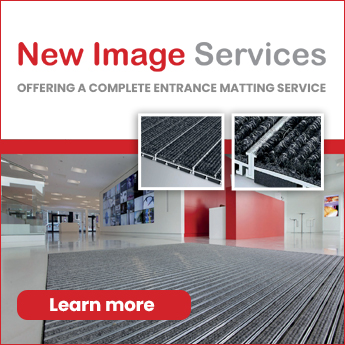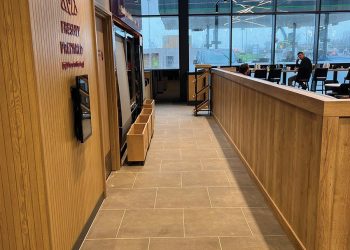Kerakoll’s Biogel, the recipient of The Tile Association’s 2018 Innovation Award, is a new type of adhesive manufactured using gel technology. The term “revolutionary” can be overused, but in the case of these adhesives is well-deserved as the Kerakoll R&D team went back to the drawing board to reinvent the adhesive formulations.
The most obvious change from conventional cement- and epoxy resin-based adhesive ranges for the specifier is the fact that there are only three products to cover all possible standard and rapid set substrate and material combinations, whether flexible or not. Biogel No Limits (standard set C2 TE S1) and Biogel Revolution (rapid set C2 FTE S1) both come in powder form, and Biogel Extreme (R2) is a two-part hybrid gel. The technology that lies behind them differs, and is examined in more detail below.
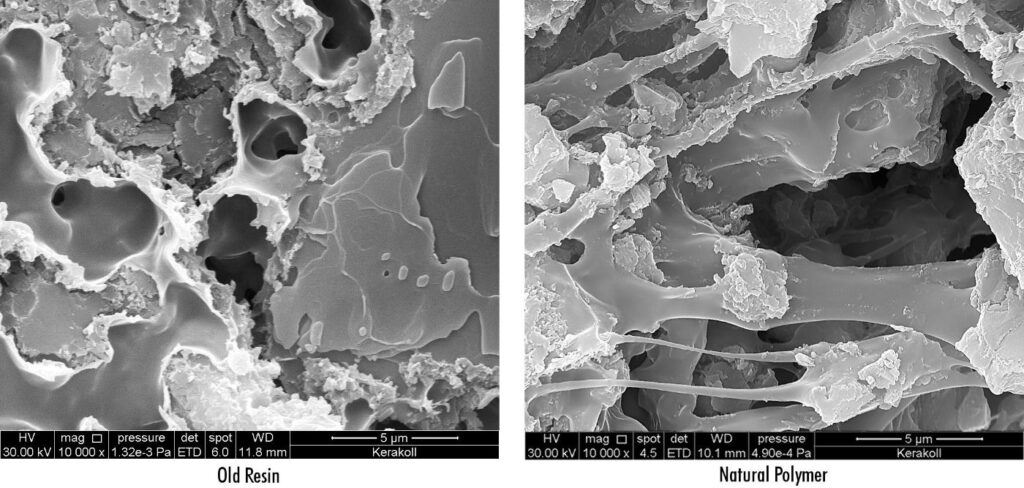
The shortcomings of traditional adhesives
With Biogel No Limits and Revolution, the challenge for Kerakoll’s R&D team was to address some of the technical shortfalls of traditional C2 cement-based adhesives. These tend to thicken quickly in the bucket and users feel they require a stiff mix to ensure that the adhesive does not shrink. As a result of both of these things, the adhesive can be quite difficult to work with. It also forms a film quickly and so does not wet the tile thoroughly. To complicate matters further, performance varies from one adhesive to another, making it hard for specifiers to make the right choice.
The Kerakoll researchers overcame this by going back to nature and identifying natural polymers with a low environmental impact and virtually no volatile organic compounds. The chosen material has a high ability to re-emulsify and re-disperse in water as well as to hold its shape. It is also extremely compatible with the hydraulic binder used in the gel adhesives. This natural polymer is a rheological additive that improves plasticity and fluidity, stops the mixture from thickening in the bucket so quickly.
To this formulation is added a mineral that is extracted without the use of chemicals, solvents or synthetic post-treatment agents. This is thixotropic and holds its shape when at rest but has low viscosity when stirred, meaning that there is no slippage, very little shrinkage and good wettability. This mineral does not interact with the binding matrix so there is no irreversible thickening.
The resulting adhesives, Biogel No Limits and Biogel Revolution, are thixotropic, smooth, and light at any thickness. They also work well on walls, with no tile slippage. The adhesive wets the entire tile as well as the substrate, giving an excellent bond and superior performance. The mix is soft and easy to spread but will still hold its shape even under the heaviest tiles. It stays “as mixed” in the bucket without thickening so can be mixed to the consistency chosen by the fixer, knowing Biogel does not shrink. Both adhesives stand up to stresses on the most deformable substrates thanks to the excellent shear strength of the low-environmental-impact resins.
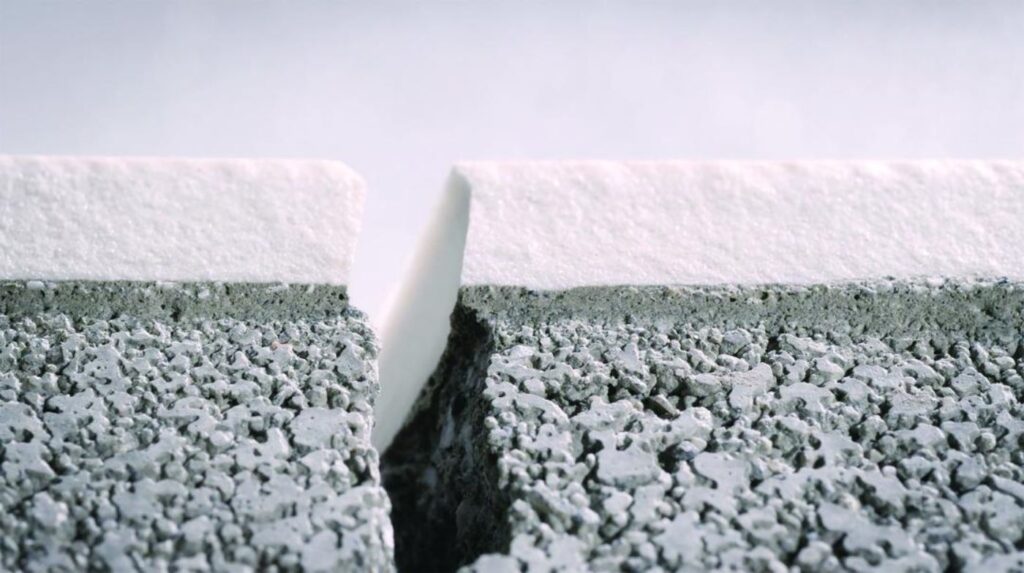
Strong environmental credentials
The adhesives also have strong environmental credentials that have been assessed using the GreenBuilding Rating; an evaluation method for measuring and improving the environmental performance of building materials. Biogel No Limits is formulated using locally-sourced minerals meaning lower greenhouse gas emissions during transportation.
The natural mineral content of the Grey variant is 63%. It has a CFP of 217g of CO2 per kg for the Grey version and 246g of CO2 per kg for the White and very low VOC emissions, rated GEV-Emicode EC1 Plus. Biogel Revolution has 242g of CO2 per kg and equally low VOC emissions.
The stated performance statistics for Biogel No Limits at 23oC are a pot life of 4 hours. Tiles can be grouted or accept foot traffic after 16 hours. Shear adhesion, for porcelain tiles, is ≥ 2.5N/mm2 after 28 days, and the tensile adhesion is also ≥2.5N/mm2 after 28 days.
For Biogel Revolution these statistics are a pot life, at 23oC, of 1 hour. Tiles can be grouted or accept foot traffic after three hours. Shear adhesion for porcelain tiles is ≥ 2N/mm2 after 28 days, and the tensile adhesion is ≥ 2.5N/mm2 after 28 days.
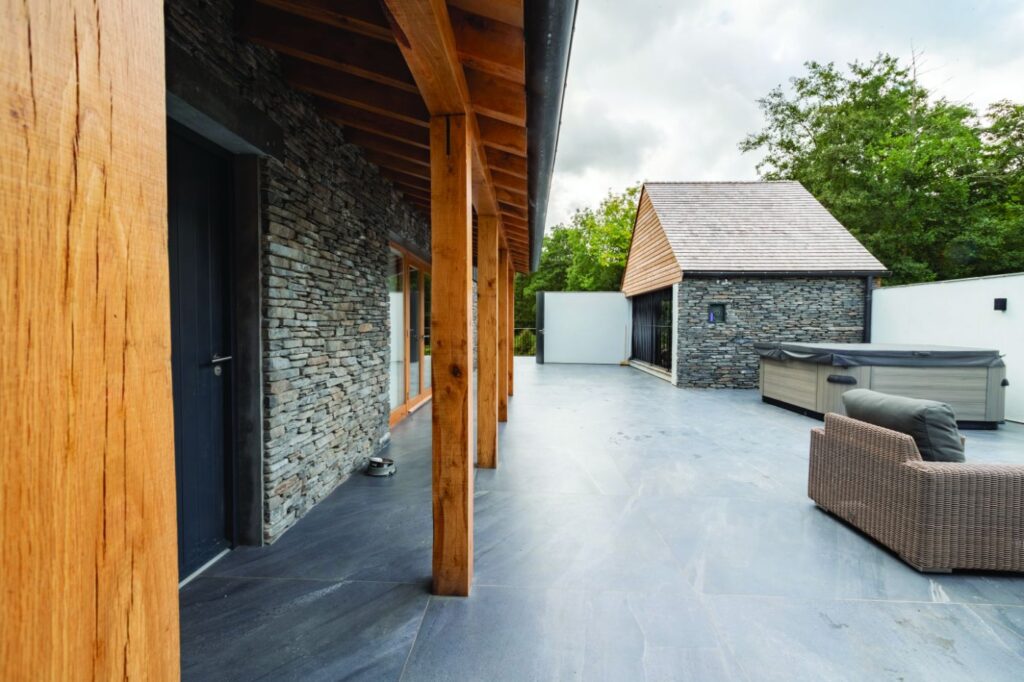
Hybrid gel technology for extreme performance
With Biogel Extreme, the research team at the Kerakoll GreenLab were looking to improve on standard reactive resin adhesives with an adhesive that could be used for all internal and external tiling even on the most demanding substrates and installations. What they came up with is a hybrid gel adhesive that bonds everything and has been tested under the most extreme working conditions. The adhesive strength (4.5 N/mm2) is 500% superior to a class C2 cement-based adhesive after 24 hours, and ten times more deformable (≥ 50 mm) than a class S2 cement-based adhesive. It is also easy to spread, being five times less viscous than a polyurethane adhesive. It achieves shear adhesion for porcelain tiles, after seven days, of ≥ 7.5 N/mm2 and tensile adhesion of 4.5 N/mm2 after 28 days. The pot life at 23oC is 110 minutes with an open time of 180 minutes, but it is still ready for foot traffic or grouting after four hours.
The science behind it uses the advantages of gel technology, seen in Biogel No Limits and Revolution such as greater workability, wettability, longer open, working and adjustment times, better adhesion and durability, and melds them with a polymer made up of different binding resins to come up with a hybrid that has the properties of both cement-based and reactive resin adhesives. This takes rigid, highly adhesive mineral nano-crystals and combines them with a flexible, hydrophobic plant-based compound to produce a hybrid polymer with a long pot life, good open time, long adjustment and short setting times which also has high deformability and resistance to stresses, and is water-resistant.
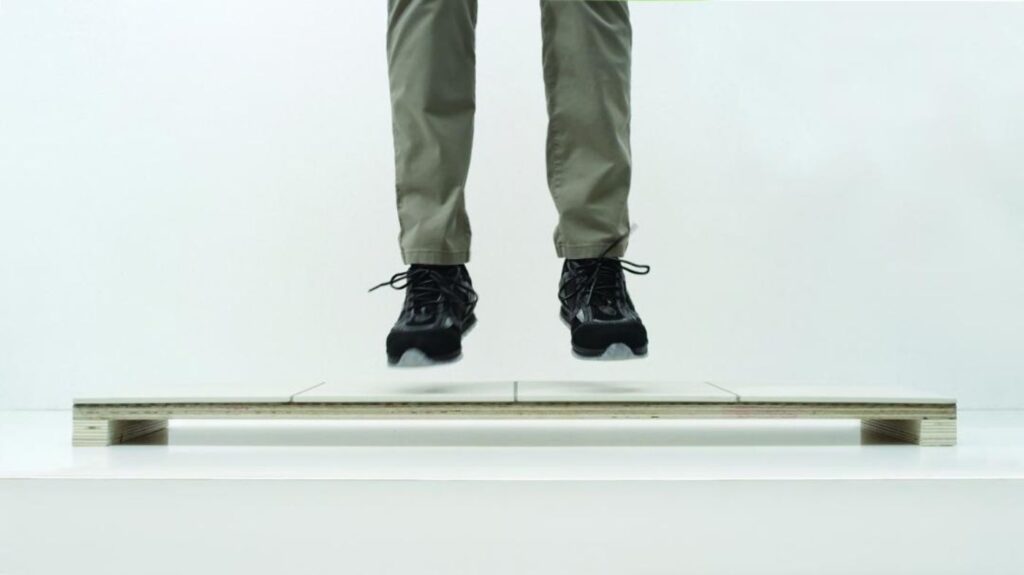
The thixotropic characteristics of the hybrid gel give excellent spreadability whilst allowing perfect penetration of the substrate by the nano-particles in the adhesive, giving very high levels of mechanical adhesion even to apparently smooth surfaces such as metal or porcelain slabs. In conventional reaction resin adhesives, contact between the adhesive and the absorbent surfaces may result in migration of the fluid parts. Kerakoll’s gel technology stops this migration giving extended workability and retaining the proper balance of binder content in the adhesive. The technology remains stable with an even distribution of all of the components throughout the gel and no segregation, separation or syneresis in storage or during use, meaning that it will always give maximum performance. In keeping with its name, Biogel Extreme also performs in extreme conditions and can be used in temperatures ranging from -40oC to +110oC.
Reaction resin adhesives can be very unpleasant to use and bad for the environment due to the nature of epoxy resins. Biogel Extreme is non-toxic and non-hazardous and made from solvent-free organic raw materials. Its carbon footprint is 7.98 kg CO2 eq per sq. metre.
Solving technical challenges
These characteristics mean that Biogel Extreme can be used with confidence on the most difficult projects and on new materials that are proving a challenge to contractors. The resin or mesh backing on the latest thin porcelain and marble slabs can react to the pH of cement-based adhesives, and the advanced thermal expansion of some elastic resins can cause difficulties. Thermal expansion can also be an issue with very large slabs used on facades and with composite materials using resin- or cement-based binders, and the cement-based materials can be very sensitive to humidity. When fixing with conventional adhesives, issues can result from the use of materials that are prone to warp such as metal coverings, large or dark coloured slabs and water-sensitive marble which can also stain from the water in cement-based adhesives.
None of these materials pose a problem for Biogel Extreme which also performs well on problematic substrates such as uncured and cracked screeds, damp, deformable or highly expansive substrates and composite ones. It can be used for waterproofing interior spaces and fixing directly on to anhydrite or gypsum screeds.
Changing industry habits
Tiling contractors are creatures of habit, hard to lure away from their favourite brands, and tried-and-trusted adhesive formulations. This is what makes the positive reaction to Kerakoll’s Biogel products so unusual and significant. Tiling contractors asked about their experience of using Biogel have been unfailingly positive. The ease of use and spreadability are universally praised.
Professional fixers also enjoy the on-site benefits of using a product that maintained a stable consistency over a long period. They are reassured by the exceptional wettability and coverage, which has helped overcome the doubts many held about working with XXL tile formats and fully vitrified wall tiles.
Architects and contractors are following suit and Biogel adhesives are being specified on an ever increasing number of projects.
Tilemaster Adhesives Ltd which supplies Kerakoll products in the UK, is part of the Kerakoll Group, a leading producer of environmentally-friendly chemical products for tiling and the construction industry.
Tilemaster Adhesives Ltd – Kerakoll Group
E: info@kerakoll. co.uk
T: 01772 456831
W: www.kerakoll.com






